|
press プレス |
|
Terre Thaemlitz a.k.a. DJ Sprinkles, Kawasaki Interview for "Assembly International" - Tara Herst |
In Assembly International, Fall 2005. Edited transcript of a video interview taken for "Assembly International," hosted by b_books on June 10, 2005, at the Kino International Lounge, Berlin Germany. Printed in the newspaper "Assembly International," fall 2005.
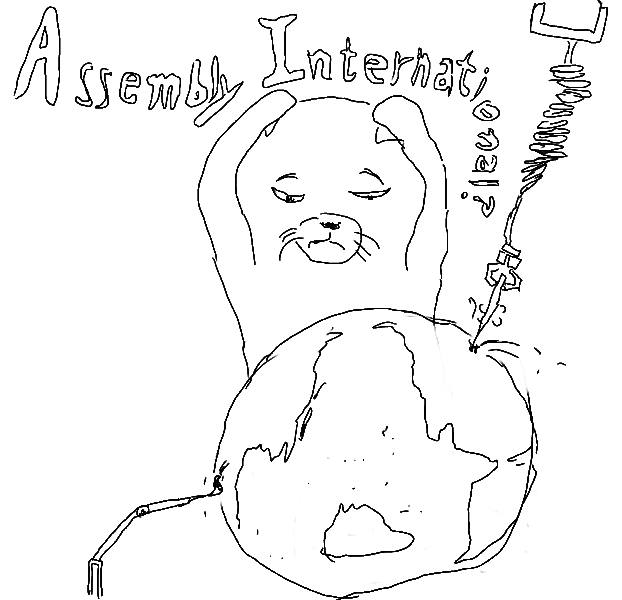
Illustration: Tsuji Aiko
Tara: Concerning your own production, do you have the impression that your work could circulate in mass media?
Terre: No, that's not my interest If everybody were listening to electroacoustic music, and instead of the Pop-music American Top 40 there was the Electroacoustic Top 40, I would not be producing electroacoustic music because that genre would be the main music associated with the power dynamics that I am in resistance to, or that I feel oppressed by. It's really in the context of being peripheral that many media formats gain their meaning, through their tensions with mass media and how they step in and out of it. Of course, it's easy to generalize that mass media circulation means somebody "sold out," or "their early work was good, but then they sold out and made it big," but I don't think you can blame an individual for wanting to make their life easier in a financial sense. I think the problem with mass media distribution is not so much the threat of producers selling out, but their being removed from the peripheral contexts in which their work had power and appropriated by the context which they were originally in critique of. It changes everything. It sucks the influence and the power out of it. I mean, if that happens to me, don't blame me... don't hold it against me. But no, I don't consider myself able to produce something that is going to be appropriate for mass marketing.
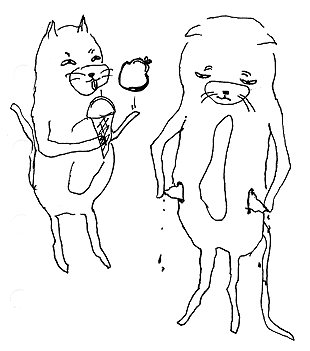
Illustration: Tsuji Aiko
Tara: What about fame and money, then?
Terre: (Invoking a romantic image:) "I'm just a poor boy from Missori who did it all by his lonesome." I think in the circles we're talking about there is not so much "fame" as "notoriety." "Fame" seems to invoke images of wealth, stardom, etc., which exists for only a very rare few you could count on the fingers of one hand. But even at my low level, it is a luxury to be able to produce music or video. And in my experience a lot of producers have come from money. Even if they live a kind of modest life from their productions, they were only able to start as producers because of the security of their families. So with all this "cutting edge" media there is still a connection between old money or family money... I guess I am talking about people who are Middle Class as opposed to really wealthy. I think that most producers who are able to sustain a career are able to do so because they have some sort of financial backing - whether it is private or commercial. I think a lot of producers come from money, and that does not make them villains (although I would sometimes like to villainize them out of envy) - a lot of times they are actually leaving behind things to lead a kind of modest life (which is my normal life, I guess). But by not talking about that history, that leaves a lot out of discussions about class and the contexts of critical music or critical media production.
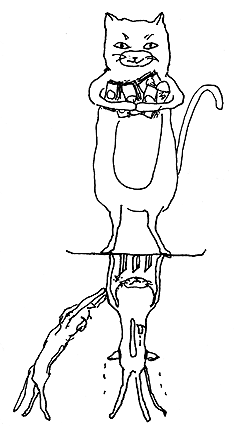
Illustration: Tsuji Aiko
Tara: And what about fame in the larger sense; like social visibility?
Terre: I don't consider myself famous, but I do think that within the circles I operate that I have pretty good visibility. For me, visibility is always a weird issue -representational visibility versus people actually being familiar with my work. Also, people always confuse visibility or media visibility with financial success, which is a big mistake. But I have been brought to Europe - it's like 1600 Euros to fly someone to Europe - to play an event where the promoters were totally enthusiastic, but when I really get there it turns out they have never heard my music before. And it is all working off of reputation. For me, that freaks me out, disorients me.... I put so much effort into focusing on issues of content and context, and trying to help people have a certain kind of experience with media, or to contextualize media, and then to actually end up earning money just from my name.... For a long time the only MP3 files I had on my website were joke sound files. They are things I had thrown together, but they had nothing to do with my music for Mille Plateaux, nothing to do with my music for Comatonse Recordings. Just silly things from my answering machine or something, but I was booked for European events based on those joke recordings!
Tara: The research for Assembly International is a research on new forms of politics, on a theoretical, practical and aesthetical level. What about your work concerning these issues?
Terre: I think my work is definitely about involving both the worlds of aesthetics and the worlds of academic philosophy or academic thinking. And also Pop commercial music market place aesthetics - the idea of releasing something for sale. I think that all those themes have been important parts of my work, but I never did really strongly associate with one particular approach enough to say, 'Oh, that's where I am coming from, so I really must incorporate that discourse.' It is more like saying: 'Okay, there are all these different established approaches, and to be honest they are all kind of shit, but they also have some connections to my experiences, or what I want try to talk about.' For me it is more about trying to combine these things in a way that both discloses and exploits their functions within different arenas, and at the same time being able to make fun of them. Like the idea of incorporating academic theoretical text in commercial CD releases it's not to look like a pompous asshole, although that is certainly one of the side effects. It is about the idea of a producer presenting concrete, thought-out ideas in a commercial audio market place that is totally against the idea of letting producers discuss their music - that is traditionally the job of journalists... or else music is supposed to be something ineffable, coming from the Rock Star's heart or soul, or that sort of thing. For me, bringing academic discourse into a commercial release is like a sarcastic gesture toward the music marketplace.
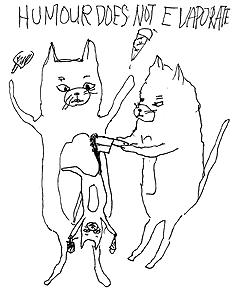
Illustration: Tsuji Aiko
Tara: Alexandre Matheron wrote "We have to choose between the voluptuous in the scandal and the glory of renouncement." Concerning the unity of identity, there is a double bind: The conflict between our values and the public opinion. There is the choice between an inner compulsion and an outer ego-boost. We all know the following dilemma: enjoy, without affirming your identity or affirm yourself, without taking pleasure, merely for the sake of existing. What would you say you live at the moment? More inner or more outer perversion?
Terre: I would have to say that the fact that I work at home must make it a kind of inner perversion.
Tara: Because you stay inside (laughs). Or do you maybe manage to combine the two?
Terre: I think that most scandals have more impact on a personal level when they are secret. I think that a public scandal does not have the same potential for personal trauma as a secret.

Illustration: Tsuji Aiko
Tara: What would a private scandal be?
Terre: For example, a public scandal - well it is not a scandal but - let's take being open about queer issues or talking about transgendered identity issues in the wrong environment... that is a public scandal. Private scandal would maybe be the discrepancy between my own thoughts or behaviours and the social contracts I have with the people around me, whether those would be partners or friends or business contracts... personal betrayal. For me the idea of public scandal is pretty diffused in contemporary culture - it does not register for me much. The challenge and the emotional impact of being harassed for dressing in drag on the street, there is a point where it is so predictable that it looses its scandal, and that's dangerous. Whenever you talk about prejudices and the kind of ways we accept them - and of course it is inevitable that everybody accepts different kinds of discrimination in their lives, as opposed to always combating it - that's where I think scandal falls apart, and also maybe where the real danger of society lies. I don't know... maybe there is something deeper in that to explore. This next electro-acoustic project that I am hoping to do is about a critique of issues of spirituality and religion, and how that is connected to a music marketplace that is very much driven around notions of "soul." It's difficult to talk critically about issues of religion and spirituality from a totally non-spiritual perspective; without pissing off the majority of people who might say, 'Well, we are not for religion, but it is not my place to say there is no God,' or this kind of ambivalent, wishy-washy thing. That has created a very stifling effect for people who would like to get further away from spiritual rhetoric and really be able to feel okay about being totally atheistic. So for me, if I think about what constitutes a public scandal for me, it is this level of benignly accepting a vague, secular spirituality that permeates all culture. In this kind of level you still have a lot of superstition; you still have a lot of ways in which the rhetoric around spirituality affects society. I think that the ways in which we accept things without thinking about them critically - like saying: 'Oh yeah, I am not for religion; I think Christianity is not a good thing,' but at the same time not having a publicly accessible discourse or way to think and clarify that opposition - in the end, that lack of ability to clarify one's opposition means you are still supporting those ideologies you oppose.
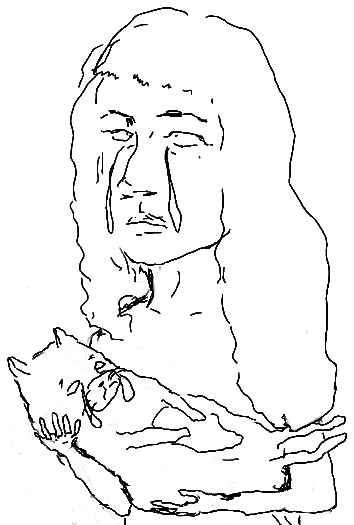
Illustration: Tsuji Aiko
Tara: Especially the moral values.
Terre: Yes. So that is for me maybe where the real notion of scandal comes into play. It is not about scandal as visibility, or revealing something hidden - it is the inversion of that conventional notion of scandal in that it does not emerge from a surprise, but simply from what is benignly accepted on a popular level without scandal. For me, that is the most violent and aggressive kind of social antagonism, those ones that we don't really sense - the ones that occur below radar.
Tara: Concerning your work, do you remember a moment where you had to consciously choose between one and the other?
Terre: When you are producing media, it has such an association with ego cults and individualism and all this kind of stuff - the mythology of artistic production...So I think when people produce things independently, it is not only hard to feel pride about what you do, but to be able to express it to others. Because if you say: 'Oh yeah, I am really happy with this project I just finished,' you come across like an egomaniac - you are like a weird, isolated asshole who is into themselves too much. It is really hard to find ways to accept the pleasure and satisfaction of working. There is also something repulsively Weberian about satisfaction - this Protestant Ethic of taking pride in your work and so forth.... So there is also something valuable about not taking pride in your work, I think. I also think that the value of pride is overestimated. I think that most culture is developed out of processes of fear and shame rather than pride. I have done many works that were clearly against the ways in which "Pride" functions as a kind of trade-marked process within gay and lesbian communities. I think there is definitely a distinction to be made between "pride" and "satisfaction." People function out of a desire for pride, but when they have it, their ability to interact socially collapses, either through their own egotistical devolution or through the reactions of the people around them. So I think it is important to distance the notion of pride and satisfaction as an ideological goal, rather than a real process. I don't want to use the word 'emotion,' but I think satisfaction is something attainable, even in a "failed" life. It does not mean that you have to be miserable if you don't have total fulfilment - nobody has got total fulfilment.
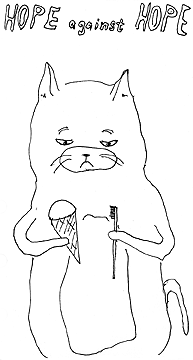
Illustration: Tsuji Aiko
Tara: One of the issues we are doing research on with Assembly is the effects of political correct criteria in relation to politically engaged communities. There is always that moralising undertone to critique. Moral in the sense of a system of closed parameters of judgment implying a superior instance to an ontology. Do you have experiences with that?
Terre: When I was younger in my early twenties, still studying in college, in New York,...
Tara: That was an art college, right?
Terre: Yeah, Cooper Union, which is really a modernist-expressionist painter's kind of school. It was not the right place for me, but I finished my degree in this Protestant Ethic kind of way - or my parents would want me to say Catholic Ethic way, but.... But at first, when I was getting exposed to a lot of ideas for the first time - exposed to ideas and writings that were allowing me to more coherently piece together directions and feelings that I had previously not elaborated on because I had not been exposed to certain kinds of discourse - at that time I was very drawn by this contrast between what [ideologies] sounded good, and the reality of what was either historically over and done with (such as Art), or what was just impractical to act upon on a daily basis in my life. Rather than trying to find an alternative morality that suits me, I am more interested in thinking about the ways in which I am engaging and effected by multiple moralities, some of which I am for and some of which I oppose, which creates a kind of hypocrisy in myself. And maybe this is what you are talking about: that there is a certain model of leftist discourse that is always trying to resolve hypocrisy rather than explode it. Or rather than let it happen. For me it is very important to think about the ways in which you can accept hypocrisy. And that is what I have tried to write about in terms of identity politics and the ways in which we assume different sexual identities with different partners, or when we are alone. We assume different identities with family, with colleagues, with friends, with lovers; and we assume different identities based on race, based on ethnicity, based on language, based on all these things; wealth and poverty, health and illness. It is not like we are just one or the other. On a conventional level, how can I really complain of being poor when my job let's me fly around the world? Rather than trying to avoid these hypocrisies, how can we share them and let people understand that the hypocrisies they are struggling with in their own lives are common, familiar, and that we can share those hypocrisies as well as trying to just deny them and find another life-course. I think part of that also means thinking about the ways our minds are poisoned from childhood by overly strict religious backgrounds, or overly repressed sexual environments, or abuse. We have to think about how those things also play with our willingness to be open-minded. There are some things we can rationalize and say: 'Okay, people should be allowed to do this,' but personally we cannot accept those same behaviors because of our personal traumas and experiences. That is why morality always fails, because it does not count on the fact that trauma and experience will inhibit our subjective ability to accept things - even "acceptable" things. For example, "freedom of religion" is one of the unquestioned precepts of most democracies, and I can rationalize the necessity for this precept in a world controlled by religious zealots (outspoken or not), but I personally find it difficult to accept the existence of any religions and wish they were all nonexistent. Of course, I can't act on this wish. And I know that even without organized religion there is still no end to idiotic ideologies - nothing would be solved. But, while I can understand and respect the need for freedom of religion, I cannot respect any religion - not a single one. It's one of the core hypocrisies of my subjective self.
Tara: Concerning the politics of sexual identity we are trying to find ways for depolarizing dialectics. I really like the way you are exploring that issue in your texts. The question is how is it possible to be politically active without positioning oneself?
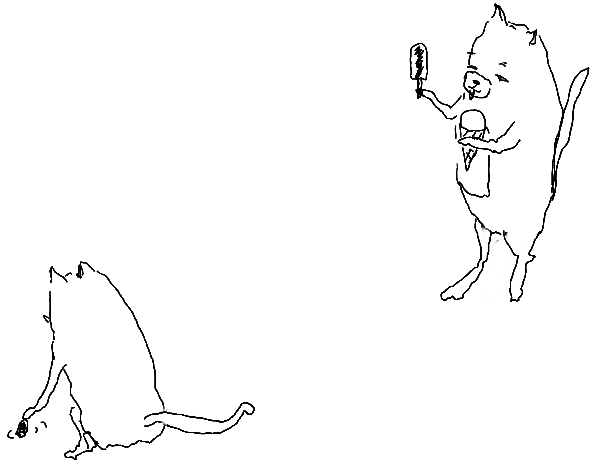
Illustration: Tsuji Aiko
Terre: I think this goes back to this thing about hypocrisy I was talking about. A conventional essentialist stance towards identity is like when you declare an identity, and for the most part it works in a very monolithic way. For example if you declare that you are straight, then that closes other experiences from you. If you declare that you are gay male that closes other types of sexual experience from you. In a kind of ideological sense, it does not mean people are not still having those other experiences, but the image - the identity - closes you in so as to define yourself. Definitions are a process of elimination, eliminating other possible meanings. That is what you where talking about before. I think because of that, it is really important to remember that identity is not about something we arrive at or something that we can declare we are, but that identity exists out of a kind of antagonism or context of positioning between powers. This can be really clearly seen in the ways in which race identity politics function very differently in America, Europe or Japan. The ways in which people arrive at defining an identity other than that associated with the mass populists in Japan means something very different than in America. So I think it is very important to think about identity as strategy. Think of it in terms of strategy as opposed to something about your being. And in that sense, allow yourself to openly expose the hypocrisies between different identities you are required to function in during different parts of the day, and in different struggles. We tend to think about identity politics in terms of rights and larger social struggles, and we think about people meeting in a room to organize and making notes and stuff.. but I think identity politics happens on the level of how we change our personalities between when we talk to our mothers and we talk to our bosses and we talk to our friends. These minute personality changes are also very much about identity politics. And we accept those changes. If you have a friend, your friend knows that when you are talking with your weird, conservative grandmother that there are some things you cannot talk about. We understand that people will behave differently, and we don't hold it against them. We understand. But when it comes to the ways in which people think about identity politics on a mass cultural level, and people coming together in groups, and 'it is us against them' and stuff, we lose that ability to forgive people for breaking their identities. That does not mean they are a liar or poseur, you know, if they have one identity at one moment and another the other. It's because their focuses are different in different contexts. So maybe there is a need to develop this notion of accepting hypocrisy in friends - maybe hypocrisy seems to be a "bad" word, but we need to make it a more friendly word and think about how hypocrisy functions, and see how we already accept that there are inconsistencies among people we know, and allow people that we don't know to also have that inconsistency. We always want people to be consistent if we don't know them, because we are afraid. This applies to basically any kind of "outsider." On a basic level, the ways that we typically interact with strangers is that we become polite and subdued in voice, unless we are assholes and in a bad mood, in which case we end up yelling at someone. There are two different directions, right? But there is a way that the fear of the unknown is also about disclosing the potential of threats from within yourself. We assume these subdued identities with strangers and... I had this fantastic point, it is just gone...oh well.
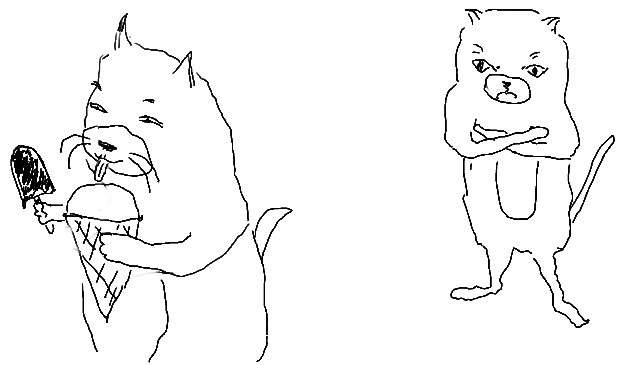
Illustration: Tsuji Aiko
Tara: Concerning the stability of identity probably, no?
Terre: Yeah. There is always the demand for stability and the demand for the stranger to be subdued - and the demand for us to be subdued in front of a stranger. And this gets compounded when we are dealing with people of different genders different races, different ethnicities, etc. In all of this, what we are really wanting is for people to act as we anticipate them to act. But maybe within friendship we have a more open understanding, like I know right now you are not going to jump up and stab me with a knife, right? Right?!? (laughs) And I think we have to find ways to negotiate with these differences between people we don't know, which involves power dynamics and real or imagined threats of violence.... I don't know...
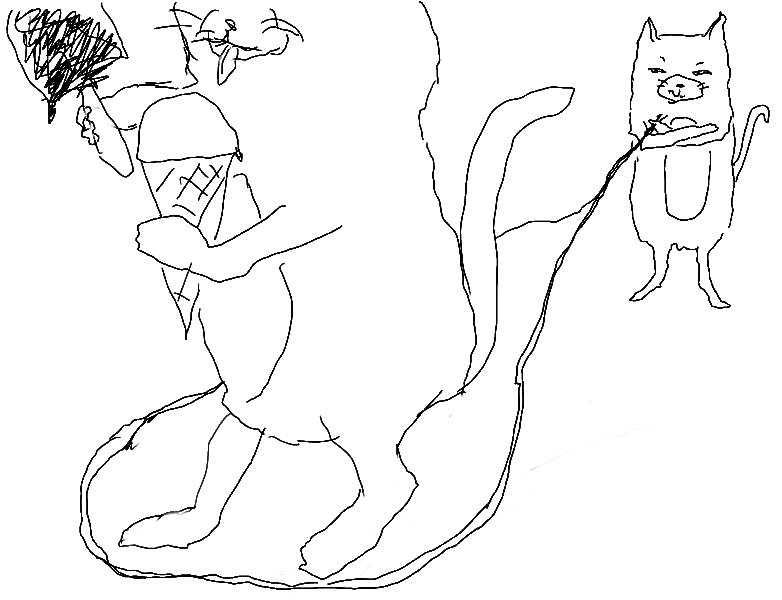
Illustration: Tsuji Aiko
Tara: And how do you think we could do that?
Terre: I don't think there is a way to do it. I am very anti-teleological in that I don't think society is getting better. I don't think humanity is coming together, I don't. I just think life is shit, and people suck, including me. Some day, a million years from now, the best thing that can ever happen to the rest of the planet is that humans die. But in the time being we have to live, and we have to eat, so we should deal with those problems we can. For me it becomes a question of which areas of my life can I maybe put more effort into playing with these different identities that mediate my existence, exposing that they exist in a state of contradiction - sometimes it is in my writings, in my music or in my personal interaction with other people - finding ways to see our own hypocrisies may be one step. Basically, we are kind of unaware of the ways in which we are hypocritical. Even if it comes down to the level of when you are in an argument with someone and they say: 'you said this.' And you say: 'I did not say that.' Who is to know who is telling the truth? There really is no truth, it is a dead end situation. But somewhere in there is a kind of hypocrisy about what we thought we were, how we thought we were, how we were received by others, and our own memory of what happened.
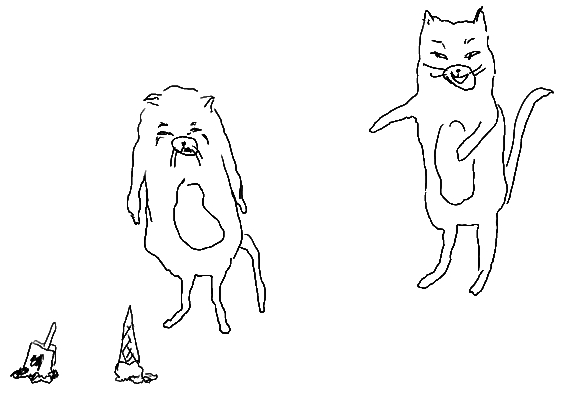
Illustration: Tsuji Aiko
Tara: Yes, and normally you remember that you don't really remember but you do as if you did.
Terre: It is getting to try to recognize the hypocrisy in one's own life.
Tara: So that is actually what you are doing a lot in your texts.
Terre: That's what I try to do. It is definitely a recurrent theme in my texts.
Tara: That was the effect it had on me when I read your texts, the effects of you connecting your personal experiences with this kind of theory. That is exactly the space that opened up; it made me become very aware of this kind of in-between things concerning myself.
Terre: Oh good, that makes me happy.
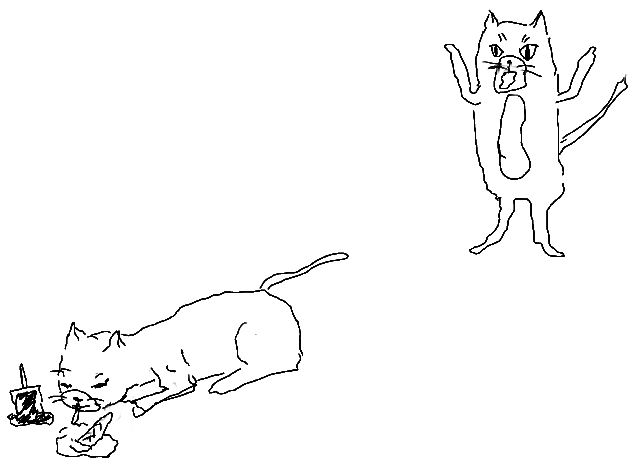
Illustration: Tsuji Aiko
Tara: It was really one of the strongest impressions I had. It continued to work in my head for a long time.
Terre: That's cool; I am flattered to be part of that kind of moment. Those are kind of fun moments with media.
Tara: So, you say that you are not struggling for a radical change of the world, what is it that you are striving for, then?
Terre: Being able to deal with myself until I am dead. (laughs) I don't know. Of course I have interests; I can't say I totally give up on the world; obviously there is some kind of investment in generating...
Tara: In your work especially there seems to be a lot of investment.
Terre: I think there is a discrepancy though - maybe a distance between my own life and the visibility that other people might see about my work. There is a difference between my own life, my own non-work related activities, and maybe the kinds of images of activities that my work conveys. Definitely my work is an activity for sure, it definitely takes up a lot of my time, and it is an emotional investment, and it is also a financial investment since I am focusing my life on this track right now. But at the same time, it is never really clear to me what kind of effect these things are having on other people, or what to expect. This is quite different from my "activist days," going to community meetings for planning and things like that - I am definitely done with this type of social position. I may come back to things - I can imagine myself coming back to doing volunteer work and things - but there is also definitely something very disheartening about my experiences with having goals, having very specific clear ambitions about the kind of world I want to see brought into existence. And the reality of never having found placement within the very activist groups I was a part of. If you can't even make that social connection to your activist group sisters, all the other rhetoric is total bullshit. But on the other hand, if you become an "Artist" its like becoming a troll living in your studio alone writing things and releasing CDs... who gives a fuck? So.... Yeah.
Tara: So what..?
Terre: Exactly.(laughs)

Illustration: Tsuji Aiko
Tara: No, so what do you think about your present situation?
Terre: Well, I think this is one of the hypocrisies of my work - engaging in critique, but being realistic about the unlikelihood of cultural change. Maybe the best thing I can do is try and find ways to be open about that hypocrisy as well. It is frustrating, but at the same time I would rather have this kind of dilemma in my life than to be under the illusion that either 'oh the world is fine, it does not need activists or whatever' or on the other hand say 'oh, yeah, fucking Socialist Party forever'. I would much rather be in the kind of emotionally fucked up state that I am in now than be a real firm believer in either one of those two ideals. I mean, that is a level of existence in itself. I think most people exist in this kind of state. We are doing things that are half feeding ideas rather than going one hundred percent in. Because once you are one hundred percent in something you are a fundamentalist, no matter what your ideology is.
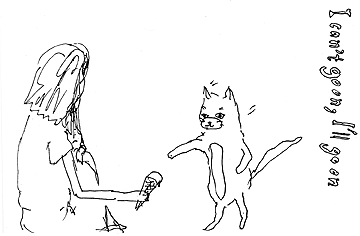
Illustration: Tsuji Aiko
Tara: But your work, your music, your texts and your films also, I think it totally is political activism.
Terre: I consider it so, too. But it is a different kind of activism than poster boards and placards. I am doing things, but... the social networks involved in my releasing a music CD means going through very a-political channels, and it's a struggle to find a label like Mille Plateaux that was tolerant with my bullshit writing. Most labels don't want to deal with it. And then also as a musician, you get: 'Oh yeah, Terre Thaemlitz, he is the gay guy', usually very simply saying: 'oh yeah, the gay drag queen who makes political music', you know. No label wants to sign on somebody that is already so closed in by a certain type of image, like what we were talking about with identity before. For me it's about how can I fuck up that image? That is what I have been spending the last ten years trying to do....
Tara: Fucking up that image? (laughs)
Terre: Fucking up that image. (laughs) And hoping that maybe, like you said, there is a moment were you as a consumer found something valuable in that for your own thinking. If those kinds of connections can happen, that's icing on the cake. It's a real question, how to approach anything earnestly in this kind of society that makes me so unhappy.
Tara: Could you imagine a kind of feminism without essentialism?
Terre: Yeah, I can imagine it. I am a feminist. And I don't consider myself an essentialist. I think it is important to defend the notion of feminism, and understand someone like myself being feminist, rather than letting people always get away with easily dismissing feminism as only for "middle class white women" who are out of touch with the "real working women" or "women of colour." Gender issues really do affect everyone; it is not just a woman's issue. Maybe one reason why a lot of people get put off by feminism is that they think it is only about women's issues - and of course the history of feminism is associated in particular with women's rights, and was at first about women's issues - but I think it is good to bring the contemporary sexual theory, including issues of queerness and transgenderism, to feminist symposiums and meetings. I think the feedback has to go both ways, because I think there is a way in which we always pillage history for the things that benefit us, and then we don't feed back - and this includes queer and transgendered struggles. Feminism is still going on in all of its good and bad forms, and I think actually going on stronger than people who associate themselves with more radically open models of gender and sexuality want to admit. So I think there is still a need to interact with these "old school" communities in the same way people feel obligated to interact with old school left wing communities, or lesbian and gay communities. I think it is really important to feed back into it. In the same way that a lot of early leftist Marxist or feminist theories may have clicked on lights in our minds, people in those communities are also still looking for things to click in their minds - even if sometimes we think that these people are kind of trapped or stuck. And I think exchanges of dialogue is the way to do that. But it is hard to overcome antagonisms, especially between transgendered communities and women's advocacy models of feminism. It is true that a lot of transgenderism is really based on trying to assimilate with very regressive, cliché models of gender representation. And I think it is really easy to look at somebody who wants to go from being a husband to being a housewife, and think, 'what a boring regressive transition to undergo in terms of lifestyle.' I think many of us are left wondering why would you want to dig yourself out of one hole just to jump in into another? But on the other hand, if you really think about the social processes involved on a personal level, to go from a total rejection of one's associated gender from birth - whether that be one's biological gender or one that is socially ascribed on them - into something totally in the other direction.... I think we overestimate the power of people's imagination, and want to think that someone who goes through all the trouble of leaving one gender would have the fantastic imagination to arrive at something "new" or "progressive." That's simply not so - and I think it is asking too much. Transgendered people are not super-human - they are typical people with all the typical limitations. So it's important to see how even in transitioning into the most conventional and mundane of women's identites, there is something incredibly difficult about that, still. And it is really asking a lot from someone who has already gone through that to go the next step and be politically correct - particularly in a society that demands conformity. It is asking a lot. And it is funny that we are really quick to ask that of people who are doing those things, when we don't ask it of the men and women who are just kind of getting by.
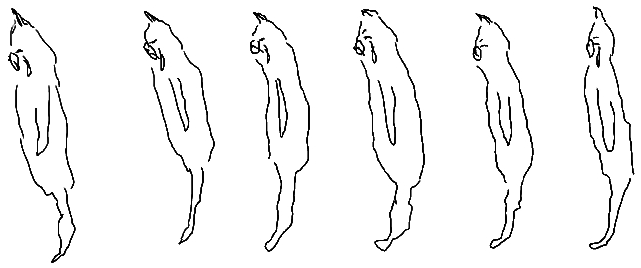
Illustration: Tsuji Aiko
Tara: Yes, exactly.
Terre: And I think it is important to stir this up. And that also involves stepping back into these places that we like to think that we have come out of and moved beyond.
Tara: Yeah, I think it is also a very brutal way of totally denying that person's reality.
Terre: For me it also involves stepping the other way, too. For me it is just as traumatic to go into a transsexual support group with all the pressure to undergo medical transitioning and diagnoses of Gender Identity Disorder, as it is going to a feminist support group with a cock between my legs. I am really having issues with both situations... or they're both having issues with me!
Tara: Concerning the depolarisation of dialectics we often refer to a term that we found in your texts: non-essentialist transgenderism. It seems very productive. Could you describe what it means to you?
Terre: Should I start by defining essentialism?
Tara: Yeah. Why not? (laughs)
Terre: It is always good to start there. Essentialism deals with the idea of attributing one's identities or characteristics with a predetermined essence, or something that is very natural or inherent to the body. And non-essentialist transgenderism - or sometimes if I am feeling angry I say anti-essentialist transgenderism - is about trying to clarify the ways in which gender operates as an ideological device rooted in a series of social behaviours between people in a society. For example, thinking all people are born male or female, and that transgenderism is about trying to decide whether I want to go from my maleness into being a female, would be very essentialist kind of approach. Non-essentialist would be more like saying: I really have problems with these aspects of masculine identity, and I have these other problems with the ways in which that identity relates to conventions of women's identity and femininity, so biologically where do I place myself? How male am I in a biological sense? Does my body fall into a kind of physical grey area, or is this more of an ideological engagement for me? In what ways and on what levels am I approaching all these issues of gender? I think it is difficult for a lot of people to just get to that point, seeing gender as something related to the body, but not rooted in the body. Because the way western society functions, it is really all built around this fundamental assumption that you are male or female. We are still living in this basically retarded idea of gender and sexuality. This really also becomes apparent when you look at Saturday morning cartoons. The commercials for children's toys... the kinds of lifestyles that girls are supposed to be living, and the kind of lifestyles marketed towards boys, are really disturbing and frightening. Okay, getting back to your questions, non-essentialist transgenderism, then, means really thinking about the ways in which gender functions as something learned. Something that we interact with. It is not to deny biology, but to say: hey our understandings, our preconceptions of biology are limited. For example the premise that people are male or female is very limited, because a very large number of people are born every year that are not 'male' or 'female'. And it is not like there are just three genders - transgenderism is not about a third gender, either - it is saying there are tons and tons of genders and body types, and that the actual process of categorizing gender itself is erasing and making invisible these others gradations and other types of existence. What we know about biology is very limited and is something that we learn. Most women still don't even look at their own vaginas closely in a mirror, let alone at other women's, and most men don't look closely at any cock other than their own - and all of this preserves one's self image as concretely fitting into a model of "man" or "woman." Depending on whom you ask, I think the statistics on "clearly defined" intersex birth range from 1/2000, to 1/65,000. There are a lot of variations on physical gender to begin with. And from there we get into how we then learn to identify with a male or female gender. And if our body is falling into a grey area, those impositions are especially reinforced from an early age to make up the difference between body and identity. In my case, my arrival at transgenderism comes from a kind of inverted socialization experience that - as strange as this may sound - I think was really connected to the fact that I wore glasses since I was two years old. And back in 1970 they did not have these really cool thin lenses. Back then, for the strength of lenses that I need you wore "coke bottle" glasses that really made you look defective. It was an image of weakness which eradicated my potential for masculinity. So from the first days I had very strange interactions with other children... I don't know, do you wear contacts?
Tara: No.
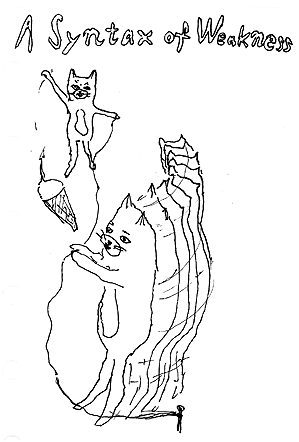
Illustration: Tsuji Aiko
Terre: Maybe a lot of people who have worn glasses have had the experience where they met a baby, and the babies cry because they have never seen someone wear glasses before. If you see someone's eyes through distorted lenses, then it registers as a kind of physical deformity, and triggers a kind of weird rejection response on an animalistic level. In thinking about how we approach gender, which for me was about being labeled weak, and by association being girlish, being identified as a girl in those first years - and then once some of the other kids had notions of sexuality it changed to being the homo, being the fag. And all this stuff was happening to me before I had any personal sexual or gender awareness. Of course I identified as a boy, but it was more like I was like a tomboy who hung out with the tomboy girls. I could not really hang out with the boys. My best friend in early elementary school was a tomboy. In the first grade, at six years old, I was kicked out of the boys lunch table and made to eat lunch at the girls table, and that sort of thing.
Tara: The boys kicked you out?
Terre: Yeah.
Tara: And did the girls welcome you?
Terre: Yeah, they were okay... as long as I showed them my penis. (laughs) Although, I thought they had penises, too. I thought the only difference between girls and boys was that girls had long hair and that they were nicer. It always frustrated me that they never showed me their penises, too. So we all have these kinds of different experiences, through which we come about our identity. I am able to identify certain key experiences that affected me because a lot of my experiences were antithetical to most boys' experiences. Unlike someone who lives a "standard" life, I can more easily recognize that I had these weird socialization things happen to me, and these led to my acceptance or rejection of certain models of gender and sexuality. When I really came into the idea of transgenderism around the age of fifteen or sixteen, it was really about the idea of gender fuck. And about cross signals, you know... not being a girl, but being a boy who was not socialized as a boy. Like, every day going to school in this little Midwestern town with my mother's full set of rhinestone jewelry - bracelets and necklace and earrings - and at the same time wearing combat pants. It was just about totally fucked up gender signifiers that did not coalesce into anything. And I was very against this idea of dressing as a woman, trying to be like a woman - for me that was totally boring. But as I got older, and entering the marketplace for work, ...it is very difficult for trangendered people to find jobs where they can work as transgendered. One of the best things about doing the kind of work I do is that I am actually able to work transgendered. But when I was working in an office, and also in my college years, that was when this division came: 'Okay, I am a boy here, and now when I do drag it is really more like women's drag as opposed to this in-the-middle gender fuck thing.' So, that is how I arrived at what I do. And actually doing full women's drag was a kind of ideological compromise for me - it was not my interest. But at the same time it was necessitated by living in cultures that don't accept transgenderism. At least in Japan it is a little more open. Of course there is close-mindedness and people not talking to you. But in Japan if people don't like you they ignore you, they isolate you that way. In America if they don't like you its like: 'Hey faggot!', and then you get a fist in the back of your neck or something. For me getting away from the potential of immediate physical violence is really a wonderful thing, it is one of the main attractions of living outside America and living in Japan.
Tara: So you never have this kind of experience here.
Terre: I never had a physical problem. I mean, I had people giving me looks, but I never had people say nasty things. When I was 32 years old living in San Francisco - in America's big gay Mecca - I had problems dressed just like I am right now in men's clothes, not even being in drag, and still having problems with people calling me faggot and stuff on the street. America is fucked! (laughs) Anyway, talking about non-essentialist transgenderism... I think it is really important when thinking about trying to advocate for rights (which I think identity is about), to remember like we talked about earlier that identity comes out of a strategy for trying to negotiate oneself in relation to other powers that be. If you are relying on essentialism, on the idea that you are born one way or another - well, that tends to be how most liberal democratic nations work, like 'oh you can not help it if you are born Black or born Asian or born Hispanic', and therefore under a dominantly white country like America you are just unquestionably eventually given audience to the argument that 'hey look I can't help it so I deserve the same rights as you.' But racial problems are not about biology - they are about cultural and social issues. Yes, race functions in a visual way, but that is an interpretive function about how people culturally see different bodies - not about the physiology of the body itself. The actual physiology of race is a farce - racial purity does not exist, and visual signifiers can be completely lost in two or three generations at most. Still, we legislate around race based on ideas of being born into an "acceptable" or "unacceptable" body, rather than being born into an accepting or unaccepting society - which is what it's really all about. People end up legislating the body rather than the culture. It's the objectification of "otherness" which serves as a decoy from directly addressing social problems and altering power relations. That kind of biologically predeterminate argument has been a foundation of most liberal rights movements up until now, which is no surprise since Western sciences and notions of nature are obviously developed in conjunction with Western ideologies of democracy, etc., and they support each other. And of course the gay and lesbian movement has also been very much part of that. Also by transgendered people saying 'hey look I am born this way, I can't help it. I was born in the wrong body, I need to transition from being a woman into a man'. Or 'I was born gay or I was born lesbian'. It has been a conventional way to stir up a kind of sympathy to gain audience for rights. But the danger of that is in placing the potential for social change in "pre-social" natural conditions... it is denying our social capacity to choose and change social relations. It is saying: 'Hey look, the way I interact socially, is not by choice, it is by predetermination, and revolves around the body I am born into.' And if we work on legislation that is fundamentally based on a notion that we as a society have no choice, then we are eradicating the very concepts of diversity and choice that we are supposedly advocating for - we are legislating the body. Who's body? What body? That's precisely what we want to get away from, because it is ideologically no different than the oppressive favoritism granted to Straight White Men of Wealth, simply expanding the definition of the acceptable social "body." So non-essentialism is about saying: 'Hey, look, born this way or not, basically what we are talking about is social change. We are talking about how we can enact social change, and this comes through interaction.' The world is not going to improve by increasing the number of people who are born gay. The world is going to change by people accepting sexual difference. I mean, if we would really take essentialist gay rights to an extreme then we must increase the number of gays and lesbians in this world.
Tara: That's what some of my friends say. And they are serious about that.
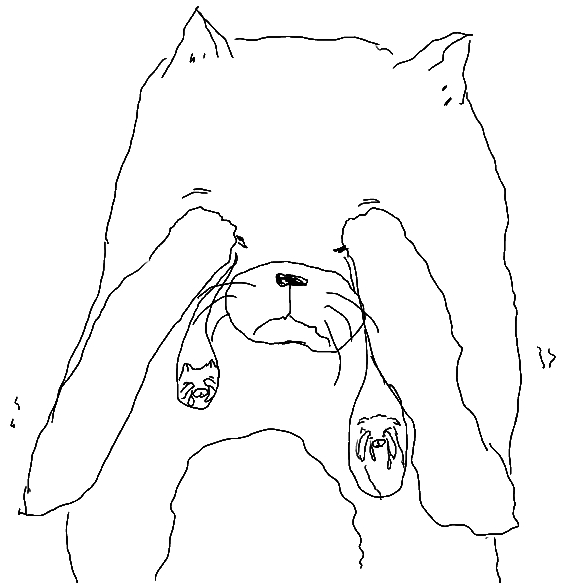
Illustration: Tsuji Aiko
Terre: I imagine so. It's also what white supremacists say about being globally outnumbered by people of color, that we need more white people. The more conventional essentialist response to gays and lesbians would be:'well, since they are the minority we can use genetics to eradicate them.' You know what I mean? We have to really be careful, if we use essentialism in our arguments, then essentialism is ultimately supporting this very same essentialist system that oppress us. I don't think we can circumvent or transcend those systems. I think there is always going to be essentialism in society. But I think that we can complicate the discourse around it so that it becomes identifiable as an ideological social function, rather than actually accepting this kind of foggy idea that we are "born this way." Once we do that, then we can see that society hasn't developed on a path, but is chaotic and maliable. If society were operating on an essentialist level according to natural laws, wouldn't that mean oppression, bigotry, sexual discrimination and racial discrimination, all these things are natural and acceptable - status quo? Basically, any essentialism is giving steam to that engine - it's a risky bed partner for any minority. Non-essentialism is about trying to find ways to talk about identity in relation to social practice, strategy and choice. Basically saying that, yes, as people we have the potential to make decisions and to make the choice to try and tolerate other people.... I don't know.... That is for me the advantage of non-essentialism over essentialism.
Tara: Yes. I agree.
Terre: There was the debate going on in the late eighties, I just think of it because I used the word 'tolerance'. The word 'tolerance' had come into vogue in pop cultural politically correct arenas. Of course the left was saying, 'Hey, look, we don't want tolerance, we want acceptance.' And I was very much a part of that 'we don't want tolerance, we want acceptance' kind of thing. But aside from the fact that it is just impossible - that in the end people are closed-minded simplistic animals that are incapable of totally accepting things they just have no experiential connection to - I kind of reversed my opinion over the years away from this idea of "acceptance" towards "tolerance." Because I think tolerance implies the hypocrisy of saying, 'it may not be in my experience to accept you, but that does not give me the right to kill you.' (laughs) I think activists and advocates for rights get dissatisfied in our own kind of inability to purge ourselves of a lot of the crap ideas that are put in our minds as children, and reinforced by society every day. It is not just things getting put in our mind, but things that we then live by without really being conscious of it. I can now see part of this in the way the left becomes very didactical, saying 'we don't want tolerance we want acceptance'. We want acceptance, but it is not going to happen. If some people can concede that it is not going to happen - and conceding that does not mean that we are giving up, nor it does not mean that the oppressions against us are acceptable - but to be kind of realistic and try and find ways place our own unhappiness in the world, rather than being consumed by dreams of eradicating unhappiness... that is also something that is important and something that gets left out. I think that a lot of identity politics is motivated by people who are seeking a resolution to the unhappiness in their lives, and of course you can dedicate your whole life to a cause and that gives you a kind of momentum to deal with the unhappiness in your life, but you still have that unhappiness. Something I am personally interested in is finding other ways of dealing with the reality that the world is not going to change within our lifetimes to the extent that we can fantasize it changing. Things will change; things do change all the time. But as we know from what is going on in America now, things can regress as well as progress. The kinds of changes we can expect in our lives are not always about things getting better, so how do we deal with that or talk about it and still find a way to have momentum to get through life on daily basis?
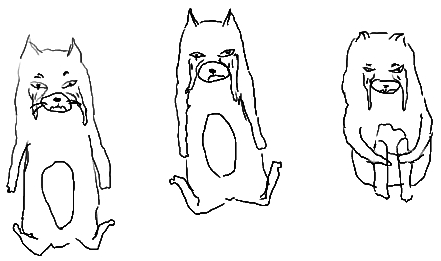
Illustration: Tsuji Aiko
Tara: Concerning communities; for me communities are at the same time a threat and a promise.
Terre: Yes, for sure.
Tara: Would you say you are part of a community or of communities at the moment?
Terre: I think we are always part of communities whether we feel we are or not. And I think that alienation is part of existing in a community. But I think what you are asking if I feel like I am participating on a more positive level as part of a community?
Tara: Yes.
Terre: Other than my enthusiastic brush with activism in the late eighties and early nineties, for me the idea of community as something promising was more like a momentary lapse of reason in my part, rather than some kind of real basis for experience. My experience in life has been that I have never had this kind of communal experience. Of course growing up this can be an incredible point of frustration, which I think is what triggered my enthusiasm for certain types of activism and community building that, in the end, collapsed all the more and made me all the more bitter because that collapse was happening in the subcultural realms where the promise of acceptance was dangled in front of you like a carrot. That's why you end up with a lot of jaded Queens and jaded activists, because it is a bitter experience to allow yourself to be open to the promise of community and acceptance, only to once again deal with the reality that it is not happening. I think the strong people, or the more healthy-minded people, are able to then reinvest in community building and activism and those kinds of things in a kind of detached way. For me, what you were saying about community being a threat, I think for me the idea of groups of people are always register as a threat. On a basic social level they are most often about sports and teams, which is really about gangs - it sounds really silly, but group activities tend to be where I have experienced violence. And whether they may have happened during pop cultural and mass accepted types of group activities like sports, or if they have been more clandestine attacks by a gang of thugs, or whatever; experiences with violence always connect to groups for me. So for me, community is definitely about threat. But on the other hand, if you think in terms of advocacy, if you organize and get a group of socially detached queer trannies coming together and forming a group, then that group is also a threat which I might be a part of. For me the idea of community building is not so much about thinking about how I can enter a state of communal contentment. For me it is more about thinking how can I manipulate the same idea of threat and aggression that community presents to me? How can I throw it back in a kind of strategic way to disrupt other communities? And I am using community in the sense of subcultural communities. For me, community activism and all that stuff is about harnessing that potential for violence and finding ways to strategically use that power to disrupt the violence against us. Maybe that is a backwards way of thinking about community... but... instead of coming together, conceiving of community blowing us apart. Maybe that is why I have been doing projects like "Lovebomb," which was about love as an ideological device rather than an emotion, and deconstructing this idea of love drawing people together. I think community building functions in the same. We think of communities as places filled with love and acceptance, or a community is fuelled by love and bringing people together, when in fact processes of community and processes of love are isolating us. They are isolating our group, setting it apart from the rest of the world in an ideological sense and create the "us" that is against "them," or that is not a part of "them."
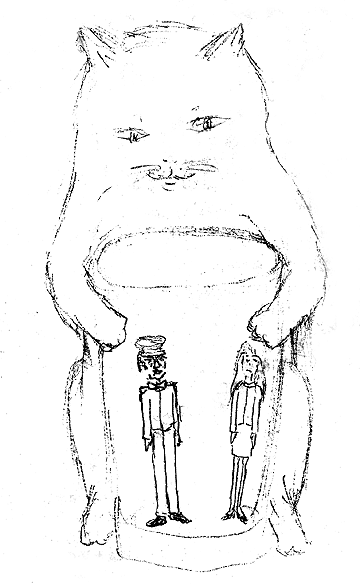
Illustration: Tsuji Aiko
Tara: And so concerning you and your friends, you would not say you are constituting a community?
Terre: No, because I think my friends are... maybe I am thinking of community in a twisted stupid way, but when I think about community and my friends, rather than my friends and I constituting a community, I tend to think of how this friend exists in this community (maybe like a kind of business world community), this other friend exists in these other communities, and maybe I exist in this kind of media production community. The idea of community, then, is about a kind of symbolic interaction or exchange that we have with society in general - the communities we step in an out of - as opposed to taking the ideas of community to heart and saying: 'community exists between us'. For me I guess community is such an abstract idea that if I had to place myself within a community I would have to say my community was something that is really detached from my personal interaction with my partner or with my friends.
Tara: Interesting. So, if we would call it maybe social context and not community...
Terre: Yes, I think that's better.
Tara: Is your work dependant on your social context?
Terre: I think that any interpretation of work is dependant upon the context of reception, and that the production of work is also contingent on the context of production, and there can be extreme discrepancies between those two.
Tara: And for you?
Terre: For me, then, a lot of my work has been about trying to play with that notion... play with the expectations that an audience will have in one area or another. And for me that extends to the ways that I have different identities as a producer in different countries. For example, in Europe I am seen more in relation to my releases on Mille Plataeux, electroacoustic abstract artsy-fartsy intelligencia type of rhetoric. In Japan I am more like a gay dj. In a kind of overly simplistic way.
Tara: But also your CD releases are considered like that?
Terre: Well, my Mille Plataeux releases don't have so much circulation here in Japan. My Comatonse Recordings label releases, which are mostly DJ vinyl, have more circulation here. If someone is a real nerd and into my music then maybe they bought the Mille Plateaux stuff too and they are piecing it together. For a Japanese person, probably their first exposure to my music was as that of a club DJ. As a European, probably their first exposure to my music was as that of an egocentric artist nut case. Maybe in America, if they had any exposure at all, which is really unlikely, it would be that I am some sort of cyber ambient guy.
Tara: But there is none in America?
Terre: Really little. When people from America e-mail me they are still talking about my first two albums on Instinct Records out of New York.
Tara: Okay last final question. What kinds of spaces are important for you now? For production and your everyday life.
Terre: I'm thinking in terms of production space. Of course by this point I have my own studio, and I have my own equipment, although it was almost all bought with money from an office job in the early 90's before I started doing this "full-time." So what's important for me is the physical means of production - like, I own the means of production. But it is very hard for me to do projects if I feel they won't be released. Like, now I am in the situation where Mille Plateaux is gone, out of business, and I am without a label and it is very hard these days to find people who are interested in financially supporting the production of my work. The music industry is now functioning where producers produce something, finish it, and then shop around for someone to release it. Labels don't have to put out any front expenses anymore. This also goes back to the idea how it is really difficult for producers who don't come from middle class backgrounds to find ways to finance our projects, especially if someone is slow at making projects like me, who is very much interested in context and very into thinking things out in a very anal retentive and time consuming way. It's a real problem to find ways to independently finance rent and food and utilities during the time it takes to make a project. I can't do the improvisation thing, because I am very critical of notions of improvisation I only invoke it as a kind of feminist critical gesture to parody it - such as in the Rubato series. I don't have this experience of being able to turn on tape recorders and jam for an hour and put out an album. For me, making a new album means coming up with six months rent, being able to stop everything else, focus on the project... and without financial support it is incredibly difficult to organize your life in that way. To come up with the savings and then hope that someone will release it - it is really sketchy. Lately in Japan-talking about work context- I have been doing more DJ work. I have my bi-monthly Deeperama events at Club Module in Tokyo, and it is like bringing back the Deeperama tape series I did in the late eighties as DJ Sprinkles in the transsexual clubs of New York. On the one hand, it is a lot of fun for me because it is letting me get out of this very serious thinking all the time - which is another reason why I am producing in a lot of genres. After making a project like 'Lovebomb' I feel, 'Enough!' And then I make a piano solo album or a dance album or something... its important mentally, I think. And then you can really get into doing a dance project but then you are like:' Oh this is boring', and then you want to make something more intellectually fulfilling... So for me it is like finding the context that lets me go back and forth. I think up until now Mille Plateaux has been the main thrust of my work, and that worked out for me because my main interest was in those kinds of more convoluted projects. But out of this recent DJ-ing experience, and doing that more, and trying to nurture this context of my identity as producer in Japan, I recently finished a new project called K-S.H.E, which stands for Kami-Sakunobe House Explosion. Kami-Sakunobe is this area I live in. And if people read that name in Japanese it is very uncool. And very non-Tokyo. When people interview me in magazines and they ask: 'Oh, when did you move to Tokyo?', I am very strict about saying I live in Kawasaki. Not just to play games, but to break this idea that Tokyo is where it is at. I think it is important to place what I do outside of that standardized scene of what is going on in Tokyo, and also to reflect the economic reality that I cannot afford to live in Tokyo. Naming the project after the area where my apartment is, a totally non-scene area - you came in from the city to get here, but if you go a little further its like farms and stuff - for me this kind of context is more productive. You were talking about the small apartments of your friends in Tokyo, which are basically for the same price I pay for a bigger apartment here. I kind of need space, physical space. I need a place where I feel I can actually do something and live my life. I don't want to just produce tapes and put them on the shelves. A lot of artists - like 'Artists' as opposed to 'producers' - they produce things no matter where they are... they are motivated and have the drive to make things. For me, you can have all the drive in the world, but making things is pointless unless I feel I can achieve audience - even a small audience. I want to engage in dialogue. If I have the choice of just making music for myself, that is totally masturbatory. I'd rather masturbate, if it comes to that level. So for me, context is very much about the potential for audience - not in terms of mass audience, but just the idea that somebody else will... that it will be about a kind of exchange.

Illustration: Tsuji Aiko